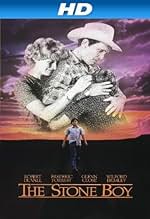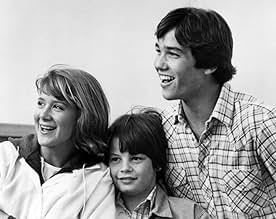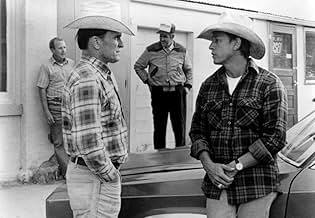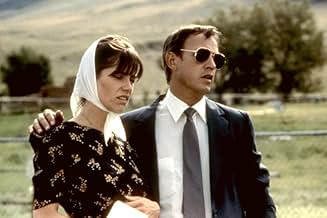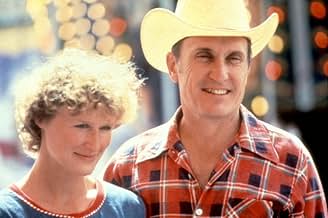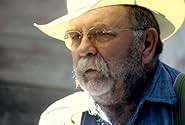Una familia de granjeros del Medio Oeste se enfrenta a un importante ajuste emocional después de que una tragedia provoque la muerte de un hermano mayor.Una familia de granjeros del Medio Oeste se enfrenta a un importante ajuste emocional después de que una tragedia provoque la muerte de un hermano mayor.Una familia de granjeros del Medio Oeste se enfrenta a un importante ajuste emocional después de que una tragedia provoque la muerte de un hermano mayor.
- Premios
- 2 nominaciones en total
Susan Rinell
- Nora Hillerman
- (as Susan Blackstone)
- Dirección
- Guionista
- Todo el elenco y el equipo
- Producción, taquilla y más en IMDbPro
Opiniones destacadas
I had seen this film way back in the 80's and had nearly forgotten it when I noticed it was on tv again and watched it. I remembered having liked this little sleeper when I first saw it, and I liked it even better on second viewing.
All of the actors, especially Robert Duvall, Glenn Close, Wilfred Brimley, Frederic Forrest, and Jason Presson (as the twelve-year-old boy who feels responsible for the accidental shooting death of his older brother), are superb. The film has a very genuine feel to it--an understated, quiet, deeply moving story of a family aching with grief. The dialogue is sparse but telling, and the nonverbal acting is outstanding. Sort of like a simpler, rural version of Ordinary People sans psychiatrist but equally impressive family dynamics.
The Stone Boy is well worth the time and emotional energy involved in watching it.
All of the actors, especially Robert Duvall, Glenn Close, Wilfred Brimley, Frederic Forrest, and Jason Presson (as the twelve-year-old boy who feels responsible for the accidental shooting death of his older brother), are superb. The film has a very genuine feel to it--an understated, quiet, deeply moving story of a family aching with grief. The dialogue is sparse but telling, and the nonverbal acting is outstanding. Sort of like a simpler, rural version of Ordinary People sans psychiatrist but equally impressive family dynamics.
The Stone Boy is well worth the time and emotional energy involved in watching it.
Both Robert Duvall and Glenn Close played their roles with such believability, I simply cried. Glenn Close's role as Ruth, showed her wanting to deal with the situation, but she was under the domination of her husband. "Let him think about what he did," Robert Duvall's character, Joe, said staunchly. The story depicted a rural family dealing with an accidental death of a son by his brother, called "The Stone Boy," meaning he was so distraught and overwhelmed by what he did, he became emotionally paralyzed. Then towards the end when Jason Presson's character, Arnold, let it all out to a stranger, I was so broken hearted for him, that I actually thought of some of the terrible things that I did in my life. I personalized and identified with his character. Frederick Forrest's and Gail Youngs' roles, did NOT add not much to the film. I thought of Frederick Forrest, who played Ruth's antagonistic, womanizing brother, Andy, as a jerk who did nothing to try to help the situation. His wife, Lou, played by Gail Youngs, acted like a crazy-lady smacking Arnold around out of frustration with her own problems without pity and blaming him for her troubles. I could NOT really feel sorry for these two. Though Lou tried to keep her marriage together, she was unsuccessful. Both did NOT deal with their problems effectively. They really did NOTHING for the film and were totally ridiculous. Wilfred Brimley's minor role as the grandfather was, touching for he was the only character that showed Arnold any attention. I felt his role should have been elaborated. The players were just doing what they felt was adequate and sufficient. However, I really liked the ending so much, I actually smiled and cried tears of joy. I felt good. The Hillermans were a family again. I actually wanted to be a part of this family. They were so realistic.
12 year old Arnald Hillerman accidentally kills his older brother Eugene. His feelings are arrested by the fact that his family can not interact with him (or feel it is not the right thing to do). His ONLY refuge is his grandfather, who is the ONLY one who seems to have compassion on him. The Realism will captivate "true-2-life" movie lovers, but will not satisfy those that desire action & thrills.
It's hard to say sometimes why exactly a film is so effective. From the moment I first came across "The Stone Boy", something told me it would be a great film. In spite of that, it seemed very unlikely that I'd ever have the opportunity to actually see it for myself. Then, one day, while looking through the online catalogue of my local library, I saw that they had recently purchased the DVD release of this film. Which I'm extremely glad for, because the cinematography is of a stunning depth and quality that an old VHS copy could never replicate.
And speaking of the cinematography, I must single it out as far and above the most stunning aspect of this film. As a photographer who pursues very nearly the exact visual style portrayed in "The Stone Boy", I'm a firm believer in the fact that a great cinematographer can almost single-handedly carry a film. Here, he has a lot of help from an extremely talented cast, and a director who understands perfectly what the story needs. But to have Juan Ruiz Anchía behind the camera makes virtually every scene something of beauty. And you can almost never say that. Most films would never even expect such a thing of you. Scene after scene captures some detail, some little bit of visual magic that takes your breath away.
The director, Christopher Cain, has had a long and interesting career. As far as I can gather, this film is not very representative of it. But, sometimes, to catch a director near the beginnings of his career, before all the big budgets and loss of focus, there's a real subtle magic to be found. Cain steps back in this film, lets things happen with a life of their own, and then ever further. Much like early John Sayles films, characters are given space to breathe, time to talk. Side stories happen because they do, and that's how life is. Cain displays a remarkable, raw, even outright painful understanding of human nature in this film.
The acting ties much of this story together. When people talk, when they exist in this film, they do so as actual people, not held back by the fact that they are playing characters. Gina Berriault's script allows immensely talented and respected actors like Wilford Brimley, Robert Duvall, Glenn Close, and Frederic Forrest to spend time simply existing. Whether the things they have to say are minor or of deep significance, it all comes down with the weight of pure reality.
When you look at the actors involved, or the great soundtrack by James Horner, it seems strange that such a film be very nearly forgotten. Maybe much of what makes "The Stone Boy" what it is was the time period it was made in. There's this 1970s hangover feeling to this picture that reminds me deeply of my own childhood. People talk of the 80s in terms of modern styles and music, but that's not the 80s I lived in or remember. The look of the images, the understated and dark knowing quality of the acting, and the overall result should get under the skin of any person who grew up in or near this era of time in rural North America. I see myself in this. I see how I saw the world. And a film like "The Stone Boy" sees the world for how it truly is.
For more of this feeling, please see:
The Black Stallion (1979), Never Cry Wolf (1983), Tender Mercies (1983), Testament (1983), Places in the Heart (1984), Matewan (1987), High Tide (1987), Driving Miss Daisy (1989), The Secret Garden (1993), The Secret of Roan Inish (1994), Wendy and Lucy (2008)
And speaking of the cinematography, I must single it out as far and above the most stunning aspect of this film. As a photographer who pursues very nearly the exact visual style portrayed in "The Stone Boy", I'm a firm believer in the fact that a great cinematographer can almost single-handedly carry a film. Here, he has a lot of help from an extremely talented cast, and a director who understands perfectly what the story needs. But to have Juan Ruiz Anchía behind the camera makes virtually every scene something of beauty. And you can almost never say that. Most films would never even expect such a thing of you. Scene after scene captures some detail, some little bit of visual magic that takes your breath away.
The director, Christopher Cain, has had a long and interesting career. As far as I can gather, this film is not very representative of it. But, sometimes, to catch a director near the beginnings of his career, before all the big budgets and loss of focus, there's a real subtle magic to be found. Cain steps back in this film, lets things happen with a life of their own, and then ever further. Much like early John Sayles films, characters are given space to breathe, time to talk. Side stories happen because they do, and that's how life is. Cain displays a remarkable, raw, even outright painful understanding of human nature in this film.
The acting ties much of this story together. When people talk, when they exist in this film, they do so as actual people, not held back by the fact that they are playing characters. Gina Berriault's script allows immensely talented and respected actors like Wilford Brimley, Robert Duvall, Glenn Close, and Frederic Forrest to spend time simply existing. Whether the things they have to say are minor or of deep significance, it all comes down with the weight of pure reality.
When you look at the actors involved, or the great soundtrack by James Horner, it seems strange that such a film be very nearly forgotten. Maybe much of what makes "The Stone Boy" what it is was the time period it was made in. There's this 1970s hangover feeling to this picture that reminds me deeply of my own childhood. People talk of the 80s in terms of modern styles and music, but that's not the 80s I lived in or remember. The look of the images, the understated and dark knowing quality of the acting, and the overall result should get under the skin of any person who grew up in or near this era of time in rural North America. I see myself in this. I see how I saw the world. And a film like "The Stone Boy" sees the world for how it truly is.
For more of this feeling, please see:
The Black Stallion (1979), Never Cry Wolf (1983), Tender Mercies (1983), Testament (1983), Places in the Heart (1984), Matewan (1987), High Tide (1987), Driving Miss Daisy (1989), The Secret Garden (1993), The Secret of Roan Inish (1994), Wendy and Lucy (2008)
The Stone Boy is a tragedy of Midwestern stoicism in the face of inconsolable grief. Arnold accidentally shoots his brother and is frozen out by his family, with the exception of his grandfather. The process for everyone is painful to watch, but handled very quietly. I was very reminded of Tender Mercies, another great Robert Duvall film. It is drama at its best and a film I recommend highly.
¿Sabías que…?
- TriviaAccording to the American Film Institute's AFI Catalog, ''thirteen-year-old newcomer Jason Presson earned critical praise for his performance in the title role, receiving a prize from the Academy of Family Films and Family TV, a Best Actor nomination from Youth In Film, and a four-picture deal at Paramount Pictures. When Twentieth Century-Fox elected not to promote the picture for the Academy Awards, Jason's father, Ron Presson, organized a campaign for his son's nomination, financing screenings and full-page advertisements in the trades. Presson clarified in a 17 Feb 1985 LAT editorial that he did not publicize whether the role was for 'Best Actor' or 'Best Supporting Actor', believing the performance could qualify for either category. Despite these efforts, however, no Oscar nomination resulted.''
- ErroresWhen Nora and George talk at the fence, Nora's arm is on the fence when seen from behind, while from the front, she is swinging her arm.
- Citas
Andy Jansen: Days are years and years are days when it comes to sorrow. There ain't no such thing as time. It's the way it is.
- Versiones alternativasOne ending to this movie had the boy reuniting with his father by quietly slipping up next to him at the county fair, another ending had the boy reunited with his parents when they found him distraught by the loud banging of fireworks at the county fair, reminding him of the death of his brother.
Selecciones populares
Inicia sesión para calificar y agrega a la lista de videos para obtener recomendaciones personalizadas
- How long is The Stone Boy?Con tecnología de Alexa
Detalles
- Fecha de lanzamiento
- País de origen
- Idioma
- También se conoce como
- Каменный мальчик
- Locaciones de filmación
- Montana, Estados Unidos(locations: Cascade and Great Falls in Cascade County)
- Productoras
- Ver más créditos de la compañía en IMDbPro
Taquilla
- Presupuesto
- USD 2,500,000 (estimado)
- Total en EE. UU. y Canadá
- USD 261,033
- Total a nivel mundial
- USD 261,033
Contribuir a esta página
Sugiere una edición o agrega el contenido que falta


